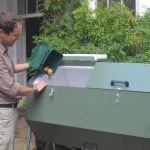13 May 2014 | Comments
The St Helena Government’s Landscape and Ecology Mitigation Programme (LEMP) – carrying out environmental mitigation works as part of the Airport Project – has recently imported ten local community compost units from South Africa. The LEMP needs significant amounts of compost for the production and establishment of many thousands of plants across the Island, including for the Airport site itself, along the Airport access road, and down to Rupert’s Bay. The composters take everyday kitchen waste and turn it into high quality compost.
Ross Towers, LEMP Project Manager, explains.
“Currently about 25% of domestic waste going to the Horse Point landfill is compostable. If we can divert this waste and make it useful, there are huge benefits. For example, the lifespan of the landfill itself will increase, the reliance on imported compost will be reduced and on-Island compost should be financially competitive. Pest species such as rats and pigeons will have less of a food source, and on-Island fruit and vegetable production will be supported.”
The composters have been brought to St Helena as a trial and will be managed locally by partners around the Island. The compost produced will be provided to the LEMP to meet its goals over the next few years.
Ross states:
“Composters like this will outlive the LEMP, reducing kitchen waste going to landfill, and turning it into a useful resource. It is hoped that a small scale private business can be established in the long run. Potentially, many more units could be brought in if it’s a success.”
The JK400 Jora composters are specially designed to be able to take cooked food scraps including meat and bones. Composting occurs at a range of temperatures, with different micro-organisms working in different temperature ranges. The temperature of the Jora composter can reach in the region of 70oC or 160oF. Such high temperatures ensure that waste is thoroughly composted and therefore suitable for use straight out of the machine. The temperature also helps to reduce issues such as maggots and bad bacteria, while the correct use of the rotating drums provides good aeration – preventing bad smells.
Ross adds:
“The units are designed and made in Sweden. But due to the exchange rate and geographic location, we were able to make savings in their procurement by buying from South Africa. They are very sturdy and I’m looking forward to the first batch of compost being created by them, hopefully in as little as 6 weeks’ time. This is a partnership scheme and I would like to thank my colleagues in EMD for their support, and to all the external partners who will be taking part.”
One picture accompanies this release.
SHG
13 May 2014

Comments